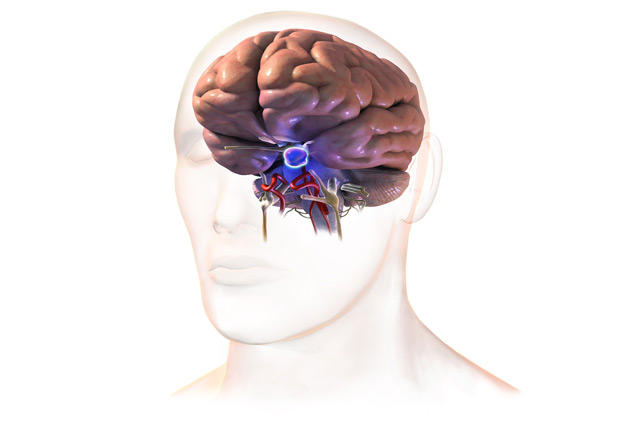What is Pituitary Tumors?
Pituitary tumors are nothing but abnormal growths forming on the pituitary glands in the body. At times, these tumors can be non-cancerous (benign) or cancerous (malignant) in nature and cancerous forms of pituitary tumors tend to cause various other complications when it affects the level of production of important hormones in the body.
In some cases, the doctor will attempt to regulate the production of hormones to normal levels using various medicinal drugs however, more severe forms of pituitary tumors requires surgical removal of the tumors from the pituitary glands in order to halt the progress of the disease as well as to relieve the various painful and disabling symptoms caused in this disease.
What are the signs and symptoms caused by Pituitary Tumors?
In some rare cases the pituitary tumor might not exhibit any noticeable signs or symptoms however in other cases of pituitary tumors the tumor affecting the hormone-production capacity of the pituitary gland shows distinct signs and symptoms according to the specific hormone-production being affected. In case the pituitary tumor does not affect the hormone production it may cause symptoms with the pressure it might be exerting on the surrounding structure due to its increasing size.
Larger (more than 1 cm) sized pituitary tumors are also called as ‘macro-adenomas’ while the ones smaller than this are known as ‘micro-adenomas’. The macro-adenomas tend to put pressure on the pituitary gland and other surrounding structures.
These are the signs and symptoms relating to pressure being caused by a large macro-adenomas tumor in the pituitary gland:
- Loss of vision (especially the peripheral vision)
- Headaches
These are the signs and symptoms seen due to affected hormone levels in the body:
- Over-functioning – Functioning types of pituitary tumors cause an over-production of certain hormones. The different type of hormone being produced excessively causes specific signs and symptoms as well as a combination of these symptoms too.
- Nausea
- Weakness
- Vomiting
- Cold sensation
- Less frequent/no menstrual periods
- Increased urination frequency and amount
- Sexual dysfunction
- Unexplained weight loss/weight gain
ACTH (Adrenocorticotropic Hormone-Secreting) tumors
This type of tumor is responsible for the production of the Adrenocorticotropic hormone which helps to stimulate the adrenal gland to produce cortisol hormone. Excessive production of this hormone in the body results in the development of Cushing’s syndrome.
These are the various signs and symptoms seen due to an ACTH tumor of the pituitary gland:
- Fat deposits form in the upper back and the torso
- Facial features tend to get excessively round
- Legs and arms tend to get thinner
- High blood sugar levels
- High blood pressure
- Weakening of bones
- Acne
- Bruising
- Psychological/emotional problems (depression, irritability or anxiety)
- Stretch marks
Growth Hormone Pituitary Tumors
This type of pituitary tumors produces excessive growth hormone which leads to acromegaly. These are the signs and symptoms seen due to excessive production of growth hormone in the body:
- Facial features tend to get coarse
- Hands/feet get enlarged
- Excessive sweating
- High blood sugar levels
- Joint pain
- Heart problems
- Increased number of hair on body
- Misaligned teeth
Prolactin-secreting Pituitary tumors
Prolactinoma, a condition which causes excessive production of the Prolactin hormone in the body, can also lead to lowered levels of sex hormones (estrogen in women and testosterone in men).
The effect of excessive Prolactin in the body results in different signs and symptoms in men and in women.
These are the signs and symptoms seen in women affected by Prolactin-secreting hormone tumor of the pituitary gland:
- Irregularity in menstrual periods
- Loss of menstrual periods
- Milky breast discharge
In men, the excessive production of Prolactin may lead to the development of male hypogonadism whose signs and symptoms include:
- Erectile dysfunction
- Low sperm count
- Decreased sex drive
- Breast growth
Thyroid-stimulating hormone-secreting pituitary tumors
In case the pituitary tumor produces excessive amount of thyroid-stimulating hormones the thyroid gland starts to produce extra amount of the hormone ‘thyroxine’. This is a rare form of hyperthyroidism and can accelerate the metabolism rate in the body, leading to:
- Rapid weight loss
- Irregular/fast heart beat
- Irritability/nervousness
- Frequent need for bowel movement
- Excessive sweating
What are the causes for Pituitary Tumors?
The exact causes for the development of pituitary tumors in the pituitary glands are not yet known. The pituitary gland is a small and bean-shaped gland which is located right behind the nose and between the ears. Although small in size the pituitary gland is one of the most important hormone-secreting glands of the body and is responsible for various functions in the body, such as the rate of growth, reproductive capacity and blood pressure levels, etc.
A small number of pituitary tumors are seen to be caused as a genetic defect, such as multiple endocrine neoplasia type I (MEN I). Pituitary tumor surgery success rate is about 60% with growth-hormone secreting macro adenomas.
Why choose Travcure for treatment of Pituitary Tumors in India?
Travcure is the leading medical tourism service provider in India. It is connected to a large network of high-class healthcare facilities spread across all its four corners, such as in Delhi, Mumbai, Pune, Chennai, etc. Travcure offers every patient with the best and most effective treatment for all forms of signs and symptoms caused by the development of pituitary tumors in the body in the most affordable manner.











